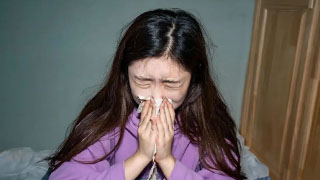
01 Flow B
Type B influenza, also known as influenza B, is a common type of cold caused by the influenza B virus. It is contagious, spreads rapidly, and can easily lead to outbreaks or minor epidemics. Compared to H1N1, H1N1 has more gastrointestinal symptoms. Some children may initially present with abdominal pain, vomiting, and diarrhea, which can easily be mistaken for gastroenteritis.
The symptoms of influenza B are similar to those of a cold, including fever, runny nose, sore throat, cough, etc.
02 Dizziness and vomiting due to the second stream
Some patients with strong immunity can recover on their own without treatment, but some patients require medication treatment, which usually takes 1-2 weeks to recover. If the condition persists for a long time, there may be underlying diseases that need to be taken seriously.
Gastrointestinal type B flow is more common in children, mainly manifested as vomiting, abdominal pain, diarrhea, decreased appetite, etc.
The type B influenza virus is mainly transmitted through droplets and contact, but it can be prevented.
Firstly, during the epidemic period of influenza B, indoor ventilation should be strengthened and regular disinfection should be carried out. 84 disinfectant or alcohol spray can be used for disinfection.
Secondly, pay attention to personal hygiene and take personal protective measures. When coughing or sneezing, cover your mouth and nose with tissues, handkerchiefs, etc; Wash your hands frequently and try to avoid touching your eyes, nose, and mouth; Balanced diet, moderate exercise, adequate rest, etc.
Thirdly, vaccination is currently the most effective preventive measure, as recipients can effectively reduce the probability of getting sick.
Finally, it is important to avoid close contact with patients with flu like symptoms and to avoid crowded places as much as possible during flu outbreaks. Confirmed patients need to be isolated at home, do not work or attend classes while sick, and remember to wear masks when going to the hospital for treatment. Patients suspected of having influenza B also need to undergo isolation and treatment.
How to diagnose and treat Type 03 influenza?
When patients experience symptoms such as elevated body temperature, headache, body aches, vomiting, diarrhea, or prolonged high fever, shock, and difficulty breathing during an outbreak of influenza, they should seek medical attention immediately.
How to treat after being diagnosed with influenza B in 04?
General treatment: During the illness, patients mainly rest in bed, drink plenty of water, and if necessary, oxygen or intravenous fluids can be supplemented.
Symptomatic treatment: When symptoms such as fever, pain, and excessive sputum appear in patients, symptomatic treatment such as cooling, pain relief, and expectoration should be given.
Antiviral therapy: Within three days after infection, the use of drugs such as oseltamivir can inhibit the release of influenza B virus, reduce virus transmission, and accelerate disease recovery. But it needs to be taken under the advice of a doctor and self medication is strictly prohibited.
Antimicrobial therapy: When patients develop bacterial infections, antibiotics can be used in combination. Due to different personal conditions, there is no best or fastest medication, and medication should be taken according to medical advice.
After being cured of influenza B, although a certain degree of immunity will be obtained, different types of influenza B viruses will still come knocking on the door. To resist the virus, it is important to pay attention to balanced nutrition and choose exercises that are suitable for oneself in daily life. Long term adherence to exercise can enhance one's immune system.


